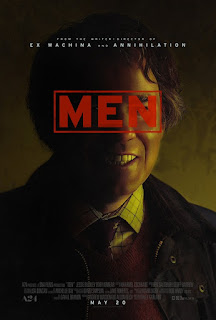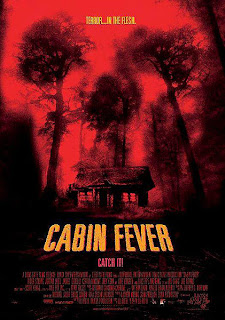"Men" reaches and grasps a vise-gripped nightmare that'll be hard to forget
Men (2022)
Author-turned-screenwriter Alex Garland has cemented himself as one of our most masterful filmmakers working today, being behind such challenging and brilliantly crafted next-level genre films. He tore out of the gate with 2015’s confidently unsettling “Ex Machina,” and followed up his impressive debut with 2017’s thrillingly strange and contemplative “Annihilation,” further proving his first triumph was no fluke. Now for his next trick in messing up an audience is “Men,” an unshakable dread-inducer of a horror piece that marries psychological hauntings, a woman-in-peril home-invasion thriller, and British folklore. Even if his reach exceeds his grasp in the end, Garland has crafted yet another bold work of disturbing ideas, artistic ambition, and a sustained mood.
An excellent Jessie Buckley (2020's "I'm Thinking of Ending Things") stars as a London woman named Harper who's devastated after a tragedy involving her husband (Paapa Essiedu). Seeking some R&R, she rents a secluded country home in a quiet English hamlet. The eccentric, awkwardly facetious estate owner, Geoffrey (one of many Rory Kinnears), shows her around the property before Harper settles in and FaceTimes her closest friend Riley (Gayle Rankin). While going on a walk through the woods, Harper spots a naked man from afar in a field, and he stalks her home to the manor with too many windows. Pretty soon, Harper’s recent past keeps haunting her, forcing internal fears to externalize into a full-blown nightmare in this not-quite-right town.
“Men” operates most effectively as a strange, increasingly surreal living nightmare, like a juicy, delicious apple that turns rotten and worm-infested. The build-up is vise-gripped and often startling with a sense of dread that just keeps festering. The beginning of everything going really sideways is when Harper goes on an innocent daytime stroll through the forest. When she comes to a dark tunnel and playfully harmonizes down the echoey abyss, a silhouetted figure emerges at the other end and starts running. This is a patient, legitimately chilling study in tension, and it’s certainly not the last! Cinematographer Rob Hardy captures the earthy, bucolic countryside, making it cozy and inviting before curdling into a forbidding, invasive bad dream. Even when things do turn nightmarish, the imagery has a lush, Edenic atmosphere (there is a motif involving forbidden fruit) with macabre poetry in slow-motion that descends into flat-out grotesquerie. The hauntingly ambient score, which later incorporates Buckley’s harmonizing, by Ben Salisbury and Portishead’s Geoff Barrow also lends to the mood that keeps you unnerved.
Jessie Buckley is giving a reactive performance, but that hardly means a flat one. Sympathetic yet complex, Buckley sensitively conveys the visceral pain that her complicated relationship with her husband has caused. We catch early glimpses and then longer moments of the last minutes with her husband to paint the full picture, and with that context, she fully deserves her time to heal. Being a woman on her own in a seemingly male-dominated village, Harper’s annoyance and discomfort with the townsmen and their micro-aggressions is more than understandable. Even if what we believe Harper is seeing is real, that doesn't lessen the sliminess around her. A young boy swears at her, a vicar is judgmental about her loss and tries comforting her with inappropriate body language, and the local policeman minimizes the incident with her nude stalker. Besides caretaker Geoffrey, Rory Kinnear does play all of the men in town (including the aforementioned boy with some canny, appropriately off-kilter face-composited CGI), and it’s impressive how he finds uncomfortable humor and true horror in each of them. Had Harper acknowledged that all of these men looked the same would break the spell of unease and paranoia Garland so expertly creates and spell out what he’s getting at thematically.
As one expects to be rewarded with more clarity to the unbearable tension and the question of what is really going on here, the payoff is . . . well, it’s something, and just as enigmatic as what came before. Garland has favored ambiguity in his previous work, but this time, the ways in which his ideas are presented on screen feel a little murky, a bit less cohesive, and almost too abstract for their own good. There’s no less to chew on and debate, even if it’s particularly hard to unpack what he’s saying here about trauma, gender dynamics, and the cycle of bad male behavior when coupling those thematic ideas with a show-stoppingly batshit-crazy visual metaphor of body horror (rebirth and orifice horror, to be specific). It's going to lose some viewers, guaranteed, but with such weird, indelibly gnarly, wildly provocative imagery on display in the final 15 minutes, it alternately becomes impossible to forget (and unsee).
As enticingly mysterious and elegantly composed as anything by the filmmaker, “Men” is bound to be considered Garland’s most polarizing film yet: it’s very much not for everyone, to say the least. It's a lot like Darren Aronofsky's "mother!" in that way. Love it, hate it, or just royally unsure what to make of it, the film does prove that it’s preferable to see an aggressively daring film that takes chances and leaves you in a daze. There’s nothing cookie-cutter, vaporous, or safe about “Men,” and amen to that.
Grade: B
A24 is releasing “Men” (100 min.) in theaters on May 20, 2022.












Comments
Post a Comment